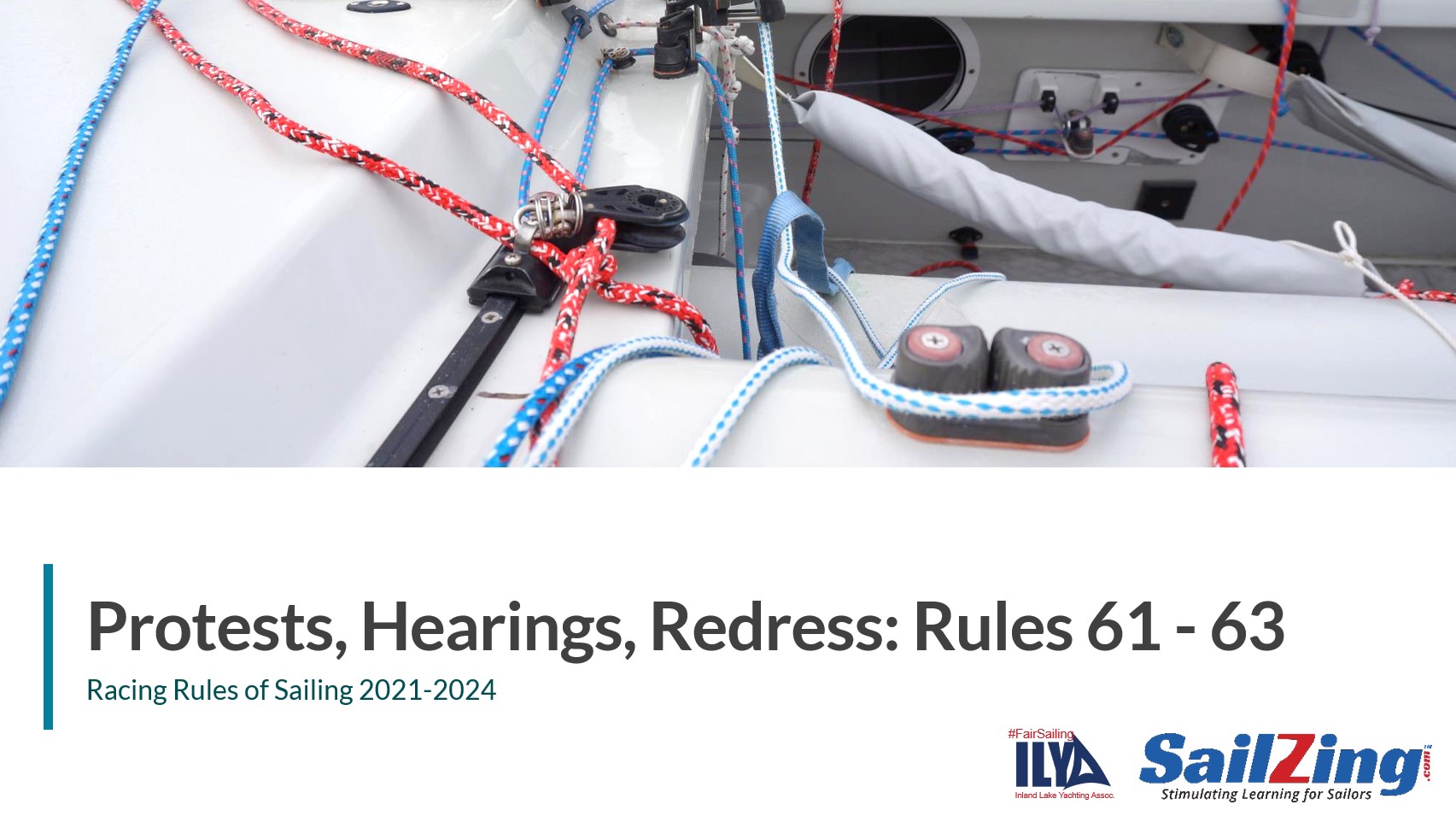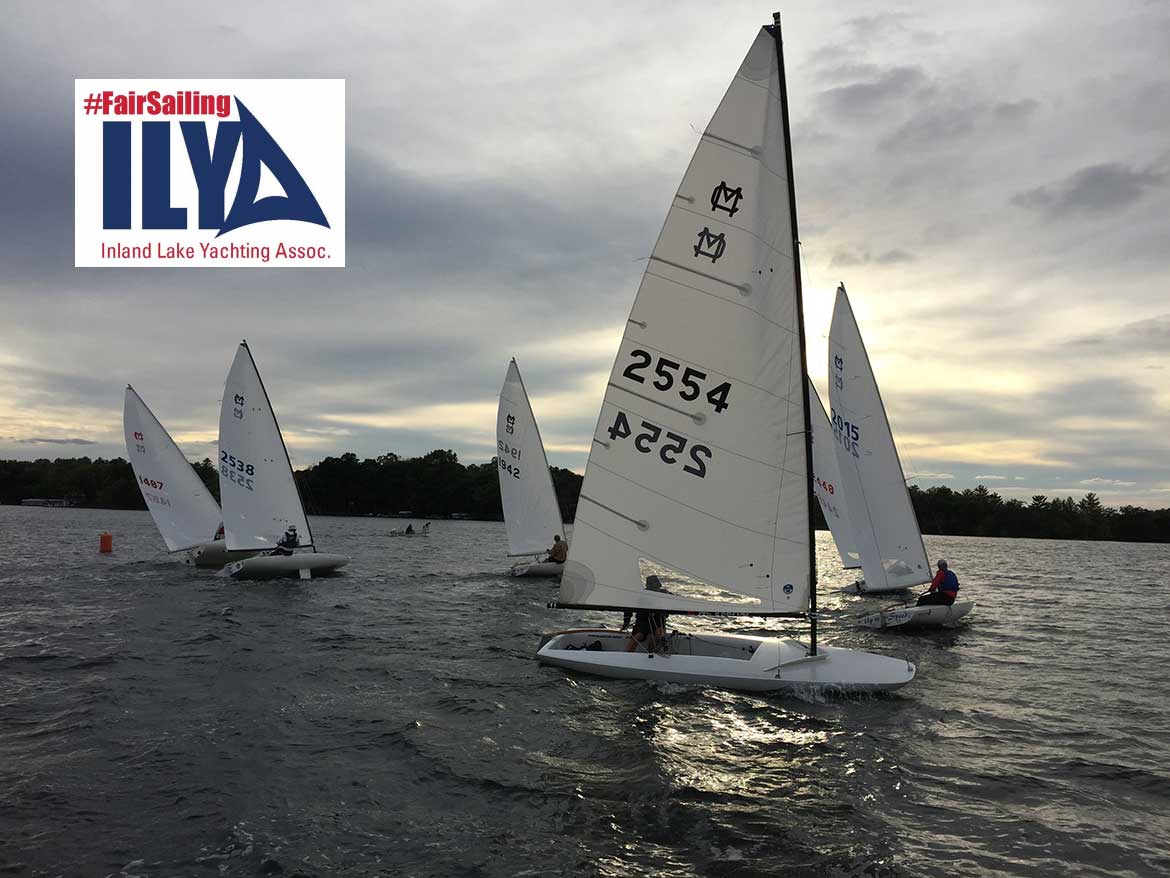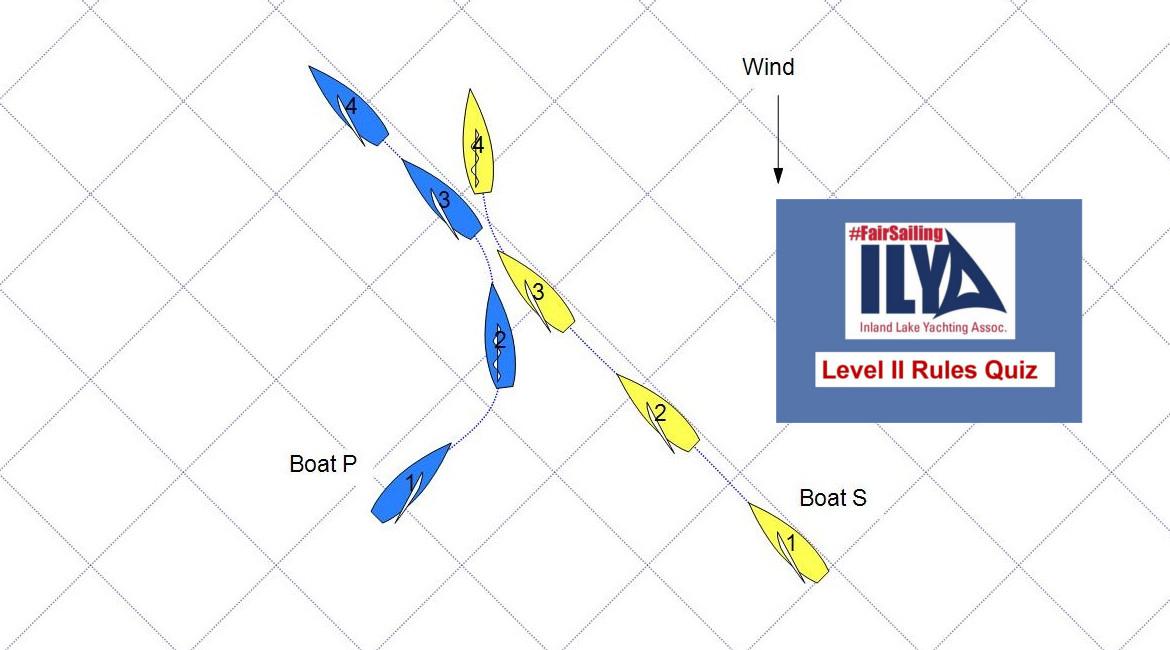In this article, we’ll highlight rules 61 – 63 regarding protests, hearings, redress from a sailor’s point of view. These rules are in part 5 of the racing rules of sailing.
This series updates the Inland Lake Yachting Association (ILYA) #FairSailing initiative begun in 2018. In the update, we’ve incorporated the 2021-2024 changes and added a video version of the article.
Video: Protests, Hearing, Redress
Rule 61 – Protest Requirements
61.1 Informing the Protestee (2021 changes shown in red)
“(a) The protesting boat shall inform the other boat at the first reasonable opportunity. When her protest will concern an incident in the racing area that she was involved in or saw, she shall hail ‘Protest’ and conspicuously display a red flag at the first reasonable opportunity for each. She shall display the flag until she is no longer racing. However,
(1) if the other boat is beyond hailing distance, the protesting boat need not hail but she shall inform the other boat at the first reasonable opportunity;
(2) if the hull length of the protesting boat is less than 6 meters [about 19 ½ feet], she need not display a red flag;
(3) if the incident was an error by the other boat in sailing the course, she need not hail or display a red flag but she shall inform the other boat either before or at the first reasonable opportunity after the other boat finishes;
(4) if at the time of the incident it is obvious to the protesting boat that a member of either crew is in danger, or that injury or serious damage resulted, the requirements of this rule do not apply to her, but she shall attempt to inform the other boat within the time limit of rule 61.3.
(b) If the race committee, technical committee or protest committee intends to protest a boat concerning an incident the committee observed in the racing area, it shall inform her after the race within the time limit of rule 61.3. In other cases the committee shall inform the boat of its intention to protest as soon as reasonably possible. A notice posted on the official notice board within the appropriate time limit satisfies this requirement.
(c) If the protest committee decides to protest a boat under rule 60.3(a)(2), it shall inform her as soon as reasonably possible, close the current hearing, proceed as required by rules 61.2 and 63, and hear the original and the new protests together.”
61.2 Protest Contents
“A protest shall be in writing and identify
(a) the protestor and protestee;
(b) the incident;
(c) where and when the incident occurred;
(d) any rule the protestor believes was broken; and
(e) the name of the protestor’s representative.
However, if requirement (b) is met, requirement (a) may be met at any time before the hearing, and requirements (d) and (e) may be met before or during the hearing. Requirement (c) may also be met before or during the hearing, provided the protestee is allowed reasonable time to prepare for the hearing.”
61.3 Protest Time Limit
“A protest by a boat, or by the race committee, technical committee or protest committee about an incident observed in the racing area, shall be delivered to the race office within the protest time limit stated in the sailing instructions. If none is stated, the time limit is two hours after the last boat in the race finishes. Other protests shall be delivered to the race office no later than two hours after the protestor receives the relevant information. The protest committee shall extend the time if there is good reason to do so.”
Rule 61 Key Points and Changes
- To protest another boat, you must hail “protest.”
- You must also display a red flag if your boat is longer than 6 meters (about 19-1/2 feet).
- Hail at the first reasonable opportunity, i.e. immediately. You can delay for the following reasons:
- Boat is too far away. If so let them as soon as possible after finishing.
- Other boat did not sail the course (no flag required in this case).
- Crew in danger, injury, or serious damage.
- Write down your protest deliver it to the race office within the time limits in the sailing instructions. If not stated, the time limit is two hours after the last boat finishes.
- Change for 2021: If the race committee protests a boat, the RC can simply post a notice on the official notice board. Make sure you check the notice board after racing.
Rule 61 Questions
- Is it mean to protest someone? Is the protest process difficult? Answer
- Another boat fouls you but there is no damage or injury. You say “do your circles” and promptly fly your protest flag (if your boat is over 6 meters long). The other boat does not take any penalty, so you file a protest following the race. Is your protest likely to be successful? Answer
Appendix T – Arbitration
You can choose arbitration if the Sailing Instructions or Notice of Race state that Appendix T is in effect. Arbitration allows for post-race scoring penalties instead of disqualification and can also simplify the resolution by avoiding a protest hearing.
T1 Post-Race Penalties
“(a) Provided that rule 44.1(b) does not apply, a boat that may have broken one or more rules of Part 2 or rule 31 in an incident may take a Post-Race Penalty at any time after the race until the beginning of a protest hearing involving the incident.
(b) A Post-Race Penalty is a 30% Scoring Penalty calculated as stated in rule 44.3(c). However, rule 44.1(a) applies.
(c) A boat takes a Post-Race Penalty by delivering to the arbitrator or a member of the protest committee a written statement that she accepts the penalty and that identifies the race number and where and when the incident occurred.”
T2 Arbitration Meeting
“An arbitration meeting will be held prior to a protest hearing for each incident resulting in a protest by a boat involving one or more rules of Part 2 or rule 31, but only if each party is represented by a person who was on board at the time of the incident. No witnesses will be permitted. However, if the arbitrator decides that rule 44.1(b) may apply or that arbitration is not appropriate, the meeting will not be held, and if a meeting is in progress, it will be closed.”
T3 Arbitrator’s Opinion
“Based on the evidence given by the representatives, the arbitrator will offer an opinion as to what the protest committee is likely to decide:
(a) the protest is invalid,
(b) no boat will be penalized for breaking a rule, or
(c) one or more boats will be penalized for breaking a rule, identifying the boats and the penalties.”
T4 Arbitration Outcomes
“After the arbitrator offers an opinion, (a) a boat may take a Post-Race Penalty, and (b) a boat may ask to withdraw her protest. The arbitrator may then act on behalf of the protest committee in accordance with rule 63.1 to allow the withdrawal.
Unless all protests involving the incident are withdrawn, a protest hearing will be held.”
Appendix T Key Points for Sailors
- Appendix T only applies if the sailing instructions or notice of race so state.
- Can’t use arbitration if there was injury or serious damage.
- An arbitration hearing occurs before the protest hearing.
- The arbitrator will offer an opinion, after which:
- A boat can withdraw the protest
- A boat can take a 30% post-race scoring penalty
- If neither occurs, the issue continues to the protest hearing
Appendix T – 2021 Changes
No changes for 2021-2024.
Rule 63 – Protest Hearings
We’ll summarize this rule, rather than go through it in detail.
If the arbitration step did not resolve the issue, you will have a protest hearing. The organizing authority will assemble a protest committee (usually 3 people).
- The protest committee will determine if the protest is valid by asking questions:
- Did the protestor hail “protest?” When?
- Did the protestor fly a red flag? When?
- Was the protest form adequate?
- The protest moves to evidence gathering:
- Both parties will explain what happened.
- The protest committee will ask questions.
- The parties will ask each other questions.
- Hear evidence from witnesses.
- The parties and witnesses will leave and the protest committee will decide the outcome.
- The protest committee will announce the decision to both parties.
Rule 62 – Redress
“61.1 A request for redress or a protest committee’s decision to consider redress shall be based on a claim or possibility that a boat’s score or place in a race or series has been or may be, through no fault of her own, made significantly worse by
(a) an improper action or omission of the race committee, protest committee, organizing authority or technical committee for the event, but not by a protest committee decision when the boat was a party to the hearing;
(b) injury or physical damage because of the action of a boat that
was breaking a rule of Part 2 and took an appropriate penalty or was penalized, or of a vessel not racing that was required to keep clear or is determined to be at fault under the IRPCAS or a government right-of-way rule;
(c) giving help (except to herself or her crew) in compliance with rule 1.1; or
(d) an action of another boat, or a crew member or support person of that boat, that resulted in a penalty under rule 2 or a penalty or warning under rule 69.”
62.2 “A request shall be in writing and identify the reason for making it. If
the request is based on an incident in the racing area, it shall be delivered to the race office within the protest time limit or two hours after the incident, whichever is later. Other requests shall be delivered as soon as reasonably possible after learning of the reasons for making the request. The protest committee shall extend the time if there is good reason to do so. No red flag is required.
(a) However, on the last scheduled day of racing a request for redress based on a protest committee decision shall be delivered no later than 30 minutes after the decision was posted.”
Rule 62 Key Points and Changes
A boat can request redress if her score was made significantly worse for the following reasons:
- Action by the race committee, protest committee (unless the boat was apart of the protest), or the organizing authority.
- Another boat caused injury or damage and was breaking a rule of part 2. 2021 change: to get redress, the other boat must have taken a penalty or been penalized. Be sure to protest the boat if needed.
- You give help to another boat in danger under Rule 1.1.
- Action of another boat, crew, or support person that results in a penalty under Rule 2 (fair sailing) or a penalty or warning under rule 69 (misconduct).
To request redress, deliver a written notice to the race office within the protest time limit. 2021 change: On the last day of racing, the time limit for requesting redress is 30 minutes after the protest committee posts the decision.
SailZing Rules Category
World Sailing – Racing Rules of Sailing





